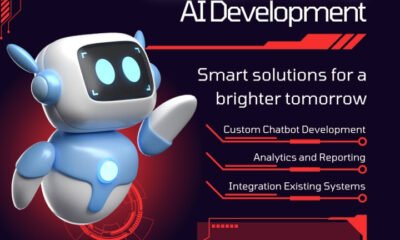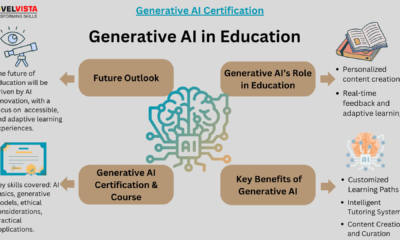Books, Courses & Certifications
Accenture Launches On-Demand Gen AI Learning Program, Powered by Content from Stanford Online
The Generative AI Scholars Program offers more than 40 hours of self-paced, best-in-class online learning taught by leading Stanford faculty and lecturers through Stanford Online course material, combined with industry insight from Accenture experts. Blending lectures, engaging discussions and practical insights pulled from peer experiences, it goes beyond theory to provide business and technology leaders with generative AI strategy and technology know-how for real-world application. Key features include easily digestible bite-sized learning, industry spotlights and case studies, module-specific checkpoints to reinforce learners’ knowledge and new skills, as well as reflection activities to apply what they’ve learned.

”As an educator at heart, I hold a profound sense of pride in creating ways for individuals not only to grasp the transformative potential of AI but also to empower leaders to prepare their organizations for new ways of working in today’s digital economy and develop an understanding of the profound impact AI will have on our society in the coming years,” said Lan Guan, Accenture’s chief AI officer and head of its Center for Advanced AI. “Inspired by the success of the Foundation Models Scholar Program, which was delivered by the Stanford Institute for Human-Centered AI to about 150 Accenture leaders, we’re now bringing the highest caliber of AI skills training to thousands of participants.”
The announcement was made today by Ms. Guan at Fortune Brainstorm AI 2024 in San Francisco.
In addition to building awareness, fluency and applied skills, the program was designed to foster a new understanding of the technical and societal challenges of generative AI while offering the ability to go deeper with courses covering topics such as technical fundamentals, foundation models, prompt engineering, agentic architecture, human-centered AI and responsible AI.
The program is hosted on the Accenture LearnVantage platform, offering easy access and personalized navigation. Like other Accenture LearnVantage enterprise learning programs, it is one of many great resources available to organizations to guide them along their talent transformation journey in the AI space.
“Against the backdrop of generative AI’s rise as one of the most transformative changes in how work gets done, we talk a lot about making people feel part of an organization’s transformation efforts by helping them build the skills they will need for the next waves of technological change. But there is little out there designed specifically with leaders in mind,” said Kishore Durg, global lead of Accenture LearnVantage. “This dynamic learning program is poised to make a mark on the upskilling landscape, allowing us to scale our ability to reach thousands more learners and prepare C-suite leaders to successfully navigate and structure their businesses for the many opportunities that technological change is bringing.”
The online Generative AI Scholars Program was born from a critical need to address the growing demand for a future-fit talent pool in light of the rapid changes occurring in the generative AI space. An earlier program, the Foundation Models Scholar Program, was first delivered by the Stanford Institute for Human-Centered AI in 2022 as an in-person, three-day intensive program for Accenture executives and senior leaders to get fully immersed in generative AI and up to speed on the latest use-cases and industry applications. That inspired the new online, on-demand program, which offers a more comprehensive curriculum with richer content and expanded accessibility.
“At the heart of our mission at the Stanford Institute for Human-Centered AI is to help develop and deploy AI in a way that benefits the world, with human-centered values at the technology’s core,” said James Landay, Professor of Computer Science and HAI’s co-founder and Co-Director. “We are pleased to provide cutting-edge content through Stanford Online to Accenture’s Generative AI Scholars Program to help more professionals understand and use AI to solve real-world challenges.”
Upon completion of the program, participants are rewarded with a certificate issued by Accenture in recognition of their new knowledge and mastery of applied skills.
About Accenture
Accenture is a leading global professional services company that helps the world’s leading organizations build their digital core, optimize their operations, accelerate revenue growth and enhance services—creating tangible value at speed and scale. We are a talent- and innovation-led company with 774,000 people serving clients in more than 120 countries. Technology is at the core of change today, and we are one of the world’s leaders in helping drive that change, with strong ecosystem relationships. We combine our strength in technology and leadership in cloud, data and AI with unmatched industry experience, functional expertise and global delivery capability. Our broad range of services, solutions and assets across Strategy & Consulting, Technology, Operations, Industry X and Song, together with our culture of shared success and commitment to creating 360° value, enable us to help our clients reinvent and build trusted, lasting relationships. We measure our success by the 360° value we create for our clients, each other, our shareholders, partners and communities. Visit us at accenture.com.
# # #
Contacts:
Christian Harper
Accenture
+1 516 434 8615
christian.harper@accenture.com
Jenn Francis
Accenture
+1 312 693 4411
jennifer.francis@accenture.com
Books, Courses & Certifications
15+ Free Certifications To Gain High-Income Skills In 2025

Learn in-demand, rare skills, and you’ll build your competitive edge
getty
You’ve seen it all over the headlines. AI is axing entry-level jobs. Computer science graduates who’ve been sold the dream of completing university and walking straight into their dream role at a Big Tech employer, are seeing their dreams shattered right before their very eyes.
The job market is relentless, and AI is making it more difficult than ever for the class of 2025 to begin their careers.
Unfortunately, it takes more than entry-level skill or merely a degree to survive the market right now. You need to know what skill sets employers are specifically needing the most in the talent market right now, so you can meet their demand, become irreplaceable by AI, and make yourself indispensable.
Employers are reporting significant skills shortages and skills gaps within different markets and industries, from software development to data analytics to design, product management, marketing, and even customer success.
For example, the most critical gap within the software development field is cloud platforms, with only 0.07% of developer resumes mentioning this skill, despite 3.98% of job posts requiring it, according to Huntr’s recent Job Search Trends report of Q2 2025.
Similarly, within data analytics, cloud platforms again emerged as the most significant skills shortage, hindering employers from tapping into high-skilled talent and reducing innovation.
In this article, you’ll learn the top skills gaps that Huntr’s report highlights, and armed with these insights, you’ll also discover how to upskill in these core areas for free, so you can gain a competitive edge and do what at least 90% of job search candidates are not doing right now.
These small tweaks could make all the difference between you landing on a thick “rejected” resume pile, or securing an interview and final offer, and even being chased down by employers because of your rare expertise.
The Biggest Skills Gaps Right Now
According to Huntr’s report, these are the competencies with the most significant skills shortages in the labor market right now And they’re high-income skills too, with most paying lucratively in roles with average salaries of $100,000 or more (like in UX design and product management). Employers are scrambling to fill these and related roles, but aren’t able to adequately fill them due to lack of access or availability of talent skilled in these very areas:
- Software development–cloud platform skills
- Data and analytics–cloud platform skills
- Design–portfolio skills
- Product management–core product management expertise
- Administrative–Microsoft Office (employers are looking for advanced-level proficiency, especially with Copilot on the scene, not just basic email typing and PowerPoint templates)
- Customer success–customer success expertise
What’s worrying about this skills gap (and you should be alarmed too) is that all of these skills can be acquired easily and inexpensively…meaning you don’t even need a degree to acquire them.
You can undertake intense technical training, or learn via a specialised course or bootcamp, and gain the necessary expertise which will put you way ahead of the rest who haven’t had such training. (More on that below.)
One thing that strikes me the most about this list of in-demand skills, is portfolio skills, which is essentially revealing that employers acknowledge that job search candidates within the design industry, i.e. fashion, graphic design, etc., are failing to create or design portfolios in a way that truly sells them.
This is a very simple error that can easily be solved, but something that many job seekers in this field unfortunately miss. Simply not having a portfolio, or one that clearly articulates your greatest strengths and the results that you’ve delivered, can stand in the way of you landing your dream job, even if you match every skill on the job description to the “T” and already have the necessary skills and experience they require.
Another thing that’s concerning is that many job seekers I’ve spoken to in my coaching experience actually have the necessary skills, but fail to show it on their resumes.
There’s no point having specific technical skills and power skills, but not demonstrating them on your LinkedIn profile and in your resume. Your skills are your greatest asset, so failing to include them puts you at the back of the queue, while those who’ve worked hard to specialise and acquire the very skills you have will win the role you wanted, not because they are skilled more than you are, but simply because they know how to show it.
15 Free Courses/Certifications To Learn In-Demand Skills In 2025
Now, to help you stand out from the crowd and impress employers and even prospective clients if you’re a freelancer, here are some free courses and certifications you can take to upskill in the areas listed above, whether you’re a software developer, UX designer, data analyst, or other professional in the industries included in Huntr’s report.
Cloud Skills Free Courses: IBM SkillsBuild
- Cloud Computing Fundamentals, IBM SkillsBuild
- IBM Cloud Essentials, IBM SkillsBuild
Cloud Skills: Oracle University Free Certifications
Oracle’s Oracle University is currently holding a “Race to Certification” which is a challenge anyone can participate in for free to upskill, gain badges and certificates, and have a chance to win some prizes and be featured on a leaderboard. Their free courses range from AI to cloud to data. Cloud courses and certificates include:
- OCI (Oracle Cloud Infrastructure) Foundations
- OCI Multicloud Architect
- OCI Developer
- OCI DevOps
- and so much more.
Portfolio Skills
Build and display your portfolio for free on platforms like:
- Canva
- Dribble
- Notion
- You can also learn on LinkedIn Learning’s courses (free with a trial or free to Premium members) such as Building a Portfolio With Adobe Portfolio
Product Management Skills Free Courses: Product School
Product School has a range of free micro-certifications such as:
- Product Prioritization Micro-Certification (PPC)
- Product Analytics Micro-Certification
- Product Launches Micro-Certification
Microsoft Office Skills Free Courses: Microsoft Learn
Microsoft has tons of hands-on training videos and step-by-step tutorials across all its apps, suitable for different roles including developers, start-up founders, consultants, and AI engineers. A few include:
- Introduction to Prompt Engineering With GitHub Copilot
- Explore Microsoft Teams (because to be honest, you’re still stuck using the same familiar features every day at work)
- Get Started With OneNote For Education (more niche, nuanced application)
- Create Business Value From AI
Customer Success Skills: HubSpot Academy
- Inbound Service Fundamentals
- Service Hub Software
How To Include These Skills/Certifications In Your Resume
- Build a portfolio of projects you’ve created while learning/past projects with results including any case studies, and include this link in your resume and LinkedIn profile.
- List only the relevant certifications, in reverse chronological order on your resume in a dedicated section near the education section.
- Where it makes sense and enables you to stand out due to your niche, include your certification by briefly mentioning it near the top of your resume, in the skills or professional summary sections.
- Don’t wait until you’ve finished; if you’re still working on completing your course, include it but write a note like “currently studying” or “due to complete by XYZ”.
It’s time to add some “oomph” to your resume and show employers exactly what your skills are worth.
Hungry for more?
Many professionals have the skills employers need, but hide them or fail to demonstrate them effectively to get hired
getty
Check out my recent article, 20 Courses & Certificates To Learn High-Income Skills In 2 Hours, for ways to learn and upskill even when you’re short on time.
Books, Courses & Certifications
XPROMOS Launches Theia Institute™-Endorsed AI Fluency Program Offering Practitioner Certification Across Business Roles. Certified AI Training With Nod From Emerging Tech Think Tank Signals AI Fluency

“The XPROMOS AI training program delivers productivity gains beyond traditional business functions like IT, BI, and analytics. It democratizes AI productivity while increasing business ROI so that everyone wins,” said Executive Director, Todd A. Jacobs.
XPROMOS launches the first Theia Institute-endorsed certified AI training program designed to build AI fluency across non-technical teams in marketing, sales, HR, and finance. This premier global endorsement supports XPROMOS’ certified AI training that turns curiosity into capability by guiding participants to create scalable AI pilots that drive measurable value. The program aligns with the Washington DC-based nonprofit think tank’s mission of responsible, ethical, and practical AI adoption.

LOS ANGELES, CA – XPROMOS, a longtime leader in revenue‑driving strategy for enterprise brands, announces a premier global endorsement by Washington DC’s Theia Institute, a non-profit emerging technologies think tank shaping the standards of responsible AI use in business and policy. XPROMOS now offers an official Theia Institute certification for AI Fluency to qualified AI Training participants in their respective domains, including marketing, sales, operations, HR, finance, and more.
“This program turns dabblers into AI Fluents: people who use AI with clarity, not just curiosity,” said co-founder Yvette Brown.
“We built it to teach AI fluency and drive business value across functions, grounded in real understanding of governance, bias, and responsible use. Theia’s endorsement validates what we’ve always believed: AI literacy isn’t enough. If teams are going to extract real value responsibly, they need fluency, so they can think with the tech, not just use it.” Yvette Brown added, “When humans don’t understand AI’s capabilities and its limitations, they create unnecessary risk. This program changes that,” concluded Yvette Brown.
XPROMOS’ training is one of the first programs of its kind to be endorsed by Theia Institute, making it a trusted on‑ramp to strategic, ethical AI integration for non‑technical professionals. Participants who complete the program are awarded a credential that aligns directly with their business function, offering credibility, clarity, and a new kind of career capital.
“We’re proud to provide our most exclusive endorsement seal to XPROMOS’ AI training materials and educational methodology as it aligns with our think tank’s focus at the intersection of people and technology of preparing people for today’s evolving workplace.” stated Executive Director, Todd A. Jacobs.
“AI Fluency credentials ensure that people in marketing, sales, and HR also benefit from the growing workplace adoption of AI tools. The XPROMOS AI training program delivers productivity gains beyond traditional business functions like IT, BI, and analytics. It democratizes AI productivity while increasing business ROI so that everyone wins.”
— Todd A. Jacobs, Executive Director
Theia Institute™ Non-Profit Think Tank
The program was built for professionals navigating the AI shift without hype; early adopters in business units who need capability, not just content. With Theia’s endorsement, XPROMOS positions its AI training not just as a course, but as a new standard for responsible intelligence.
About XPROMOS
XPROMOS is an AI Fluency accelerator built by enterprise marketing veterans. With decades of experience driving results at scale, the company now helps professionals across industries gain the skills and strategic perspective needed to lead with AI. Through its Theia Institute-endorsed training, XPROMOS empowers creators and business leaders to earn real certification as Generative AI Practitioners, making them relevant, resilient, and ready for what’s next.
About Theia Institute
Theia Institute is a nonprofit AI governance, ethics, and cybersecurity think tank based in Washington, D.C., dedicated to advancing policy and decision-making through rigorous research and comprehensive analysis. Its commitment to an ethical, balanced, and unbiased approach sets it apart in the realm of business privacy, AI governance, and public policy.
Media Contact
Company Name: XPROMOS
Contact Person: Yvette Brown, XPROMOS Co-Founder
Email: Send Email
Phone: 7143370371
City: Laguna Hills
State: California
Country: United States
Website: https://xpromos.com
Books, Courses & Certifications
Detect Amazon Bedrock misconfigurations with Datadog Cloud Security
This post was co-written with Nick Frichette and Vijay George from Datadog.
As organizations increasingly adopt Amazon Bedrock for generative AI applications, protecting against misconfigurations that could lead to data leaks or unauthorized model access becomes critical. The AWS Generative AI Adoption Index, which surveyed 3,739 senior IT decision-makers across nine countries, revealed that 45% of organizations selected generative AI tools as their top budget priority in 2025. As more AWS and Datadog customers accelerate their adoption of AI, building AI security into existing processes will become essential, especially as more stringent regulations emerge. But looking at AI risks in a silo isn’t enough; AI risks must be contextualized alongside other risks such as identity exposures and misconfigurations. The combination of Amazon Bedrock and Datadog’s comprehensive security monitoring helps organizations innovate faster while maintaining robust security controls.
Amazon Bedrock delivers enterprise-grade security by incorporating built-in protections across data privacy, access controls, network security, compliance, and responsible AI safeguards. Customer data is encrypted both in transit using TLS 1.2 or above and at rest with AWS Key Management Service (AWS KMS), and organizations have full control over encryption keys. Data privacy is central: your input, prompts, and outputs are not shared with model providers nor used to train or improve foundation models (FMs). Fine-tuning and customizations occur on private copies of models, providing data confidentiality. Access is tightly governed through AWS Identity and Access Management (IAM) and resource-based policies, supporting granular authorization for users and roles. Amazon Bedrock integrates with AWS PrivateLink and supports virtual private cloud (VPC) endpoints for private, internal communication, so traffic doesn’t leave the Amazon network. The service complies with key industry standards such as ISO, SOC, CSA STAR, HIPAA eligibility, GDPR, and FedRAMP High, making it suitable for regulated industries. Additionally, Amazon Bedrock includes configurable guardrails to filter sensitive or harmful content and promote responsible AI use. Security is structured under the AWS Shared Responsibility Model, where AWS manages infrastructure security and customers are responsible for secure configurations and access controls within their Amazon Bedrock environment.
Building on these robust AWS security features, Datadog and AWS have partnered to provide a holistic view of AI infrastructure risks, vulnerabilities, sensitive data exposure, and other misconfigurations. Datadog Cloud Security employs both agentless and agent-based scanning to help organizations identify, prioritize, and remediate risks across cloud resources. This integration helps AWS users prioritize risks based on business criticality, with security findings enriched by observability data, thereby enhancing their overall security posture in AI implementations.
We’re excited to announce new security capabilities in Datadog Cloud Security that can help you detect and remediate Amazon Bedrock misconfigurations before they become security incidents. This integration helps organizations embed robust security controls and secure their use of the powerful capabilities of Amazon Bedrock by offering three critical advantages: holistic AI security by integrating AI security into your broader cloud security strategy, real-time risk detection through identifying potential AI-related security issues as they emerge, and simplified compliance to help meet evolving AI regulations with pre-built detections.
AWS and Datadog: Empowering customers to adopt AI securely
The partnership between AWS and Datadog is focused on helping customers operate their cloud infrastructure securely and efficiently. As organizations rapidly adopt AI technologies, extending this partnership to include Amazon Bedrock is a natural evolution. Amazon Bedrock is a fully managed service that makes high-performing FMs from leading AI companies and Amazon available through a unified API, making it an ideal starting point for Datadog’s AI security capabilities.
The decision to prioritize Amazon Bedrock integration is driven by several factors, including strong customer demand, comprehensive security needs, and the existing integration foundation. With over 900 integrations and a partner-built Marketplace, Datadog’s long-standing partnership with AWS and deep integration capabilities have helped Datadog quickly develop comprehensive security monitoring for Amazon Bedrock while using their existing cloud security expertise.
Throughout Q4 2024, Datadog Security Research observed increasing threat actor interest in cloud AI environments, making this integration particularly timely. By combining the powerful AI capabilities of AWS with Datadog’s security expertise, you can safely accelerate your AI adoption while maintaining robust security controls.
How Datadog Cloud Security helps secure Amazon Bedrock resources
After adding the AWS integration to your Datadog account and enabling Datadog Cloud Security, Datadog Cloud Security continuously monitors your AWS environment, identifying misconfigurations, identity risks, vulnerabilities, and compliance violations. These detections use the Datadog Severity Scoring system to prioritize them based on infrastructure context. The scoring considers a variety of variables, including if the resource is in production, is publicly accessible, or has access to sensitive data. This multi-layer analysis can help you reduce noise and focus your attention to the most critical misconfigurations by considering runtime behavior.
Partnering with AWS, Datadog is excited to offer detections for Datadog Cloud Security customers, such as:
- Amazon Bedrock custom models should not output model data to publicly accessible S3 buckets
- Amazon Bedrock custom models should not train from publicly writable S3 buckets
- Amazon Bedrock guardrails should have a prompt attack filter enabled and block prompt attacks at high sensitivity
- Amazon Bedrock agent guardrails should have the sensitive information filter enabled and block highly sensitive PII entities
Detect AI misconfigurations with Datadog Cloud Security
To understand how these detections can help secure your Amazon Bedrock infrastructure, let’s look at a specific use case, in which Amazon Bedrock custom models should not train from publicly writable Amazon Simple Storage Service (Amazon S3) buckets.
With Amazon Bedrock, you can customize AI models by fine-tuning on domain specific data. To do this, that data is stored in an S3 bucket. Threat actors are constantly evaluating the configuration of S3 buckets, looking for the potential to access sensitive data or even the ability to write to S3 buckets.
If a threat actor finds an S3 bucket that was misconfigured to permit public write access, and that same bucket contained data that was used to train an AI model, a bad actor could poison that dataset and introduce malicious behavior or output to the model. This is known as a data poisoning attack.
Normally, detecting these types of misconfigurations requires multiple steps: one to identify the S3 bucket misconfigured with write access, and one to identify that the bucket is being used by Amazon Bedrock. With Datadog Cloud Security, this detection is one of hundreds that are activated out of the box.
In the Datadog Cloud Security system, you can view this issue alongside surrounding infrastructure using Cloud Map. This provides live diagrams of your cloud architecture, as shown in the following screenshot. AI risks are then contextualized alongside sensitive data exposure, identity risks, vulnerabilities, and other misconfigurations to give you a 360-view of risks.

For example, you might see that your application is using Anthropic’s Claude 3.7 on Amazon Bedrock and accessing training or prompt data stored in an S3 bucket that also has public write access. This could inadvertently impact model integrity by introducing unapproved data to the large language model (LLM), so you will want to update this configuration. Though basic, the first step for most security initiatives is identifying the issue. With agentless scanning, Datadog scans your AWS environment at intervals between 15 minutes and 2 hours, so users can identify misconfigurations as they are introduced to their environment. The next step is to remediate this risk. Datadog Cloud Security offers automatically generated remediation guidance, specifically for each risk (see the following screenshot). You will get a step-by-step explanation of how to fix each finding. In this situation, we can remediate this issue by modifying the S3 bucket’s policy, helping prevent public write access. You can do this directly in AWS, create a JIRA ticket, or use the built-in workflow automation tools. From here, you can apply remediation steps directly within Datadog and confirm that the misconfiguration has been resolved.

Resolving this issue will positively impact your compliance posture, as illustrated by the posture score in Datadog Cloud Security, helping teams meet internal benchmarks and regulatory standards. Teams can also create custom frameworks or iterate on existing ones for tailored compliance controls.

As generative AI is embraced across industries, the regulatory environment will evolve. Datadog will continue partnering with AWS to expand their detection library and support secure AI adoption and compliance.
How Datadog Cloud Security detects misconfigurations in your cloud environment
You can deploy Datadog Cloud Security either with the Datadog agent, agentlessly, or both to maximize security coverage in your cloud environment. Datadog customers can start monitoring their AWS accounts for misconfigurations by first adding the AWS integration to Datadog. This enables Datadog to crawl cloud resources in customer AWS accounts.
As the Datadog system finds resources, it runs through a catalog of hundreds of out-of-the-box detection rules against these resources, looking for misconfigurations and threat paths that adversaries can exploit.
Secure your AI infrastructure with Datadog
Misconfigurations in AI systems can be risky, but with the right tools, you can have the visibility and context needed to manage them. With Datadog Cloud Security, teams gain visibility into these risks, detect threats early, and remediate issues with confidence. In addition, Datadog has also released numerous agentic AI security features, designed to help teams gain visibility into the health and security of critical AI workload, which includes new announcements made to Datadog’s LLM observability features.
Lastly, Datadog announced Bits AI Security Analyst alongside other Bits AI agents at DASH. Included as part of Cloud SIEM, Bits is an agentic AI security analyst that automates triage for AWS CloudTrail signals. Bits investigates each alert like a seasoned analyst: pulling in relevant context from across your Datadog environment, annotating key findings, and offering a clear recommendation on whether the signal is likely benign or malicious. By accelerating triage and surfacing real threats faster, Bits helps reduce mean time to remediation (MTTR) and frees analysts to focus on important threat hunting and response initiatives. This helps across different threats, including AI-related threats.
To learn more about how Datadog helps secure your AI infrastructure, see Monitor Amazon Bedrock with Datadog or check out our security documentation. If you’re not already using Datadog, you can get started with Datadog Cloud Security with a 14-day free trial.
About the Authors
 Nina Chen is a Customer Solutions Manager at AWS specializing in leading software companies to use the power of the AWS Cloud to accelerate their product innovation and growth. With over 4 years of experience working in the strategic independent software vendor (ISV) vertical, Nina enjoys guiding ISV partners through their cloud transformation journeys, helping them optimize their cloud infrastructure, driving product innovation, and delivering exceptional customer experiences.
Nina Chen is a Customer Solutions Manager at AWS specializing in leading software companies to use the power of the AWS Cloud to accelerate their product innovation and growth. With over 4 years of experience working in the strategic independent software vendor (ISV) vertical, Nina enjoys guiding ISV partners through their cloud transformation journeys, helping them optimize their cloud infrastructure, driving product innovation, and delivering exceptional customer experiences.
 Sujatha Kuppuraju is a Principal Solutions Architect at AWS, specializing in cloud and generative AI security. She collaborates with software companies’ leadership teams to architect secure, scalable solutions on AWS and guide strategic product development. Using her expertise in cloud architecture and emerging technologies, Sujatha helps organizations optimize offerings, maintain robust security, and bring innovative products to market in an evolving tech landscape.
Sujatha Kuppuraju is a Principal Solutions Architect at AWS, specializing in cloud and generative AI security. She collaborates with software companies’ leadership teams to architect secure, scalable solutions on AWS and guide strategic product development. Using her expertise in cloud architecture and emerging technologies, Sujatha helps organizations optimize offerings, maintain robust security, and bring innovative products to market in an evolving tech landscape.
 Nick Frichette is a Staff Security Researcher for Cloud Security Research at Datadog.
Nick Frichette is a Staff Security Researcher for Cloud Security Research at Datadog.
 Vijay George is a Product Manager for AI Security at Datadog.
Vijay George is a Product Manager for AI Security at Datadog.
-

 Business4 days ago
Business4 days agoThe Guardian view on Trump and the Fed: independence is no substitute for accountability | Editorial
-
Tools & Platforms3 weeks ago
Building Trust in Military AI Starts with Opening the Black Box – War on the Rocks
-

 Ethics & Policy1 month ago
Ethics & Policy1 month agoSDAIA Supports Saudi Arabia’s Leadership in Shaping Global AI Ethics, Policy, and Research – وكالة الأنباء السعودية
-

 Events & Conferences3 months ago
Events & Conferences3 months agoJourney to 1000 models: Scaling Instagram’s recommendation system
-

 Jobs & Careers2 months ago
Jobs & Careers2 months agoMumbai-based Perplexity Alternative Has 60k+ Users Without Funding
-

 Funding & Business2 months ago
Funding & Business2 months agoKayak and Expedia race to build AI travel agents that turn social posts into itineraries
-

 Education2 months ago
Education2 months agoVEX Robotics launches AI-powered classroom robotics system
-

 Podcasts & Talks2 months ago
Podcasts & Talks2 months agoHappy 4th of July! 🎆 Made with Veo 3 in Gemini
-

 Education2 months ago
Education2 months agoAERDF highlights the latest PreK-12 discoveries and inventions
-

 Podcasts & Talks2 months ago
Podcasts & Talks2 months agoOpenAI 🤝 @teamganassi

















